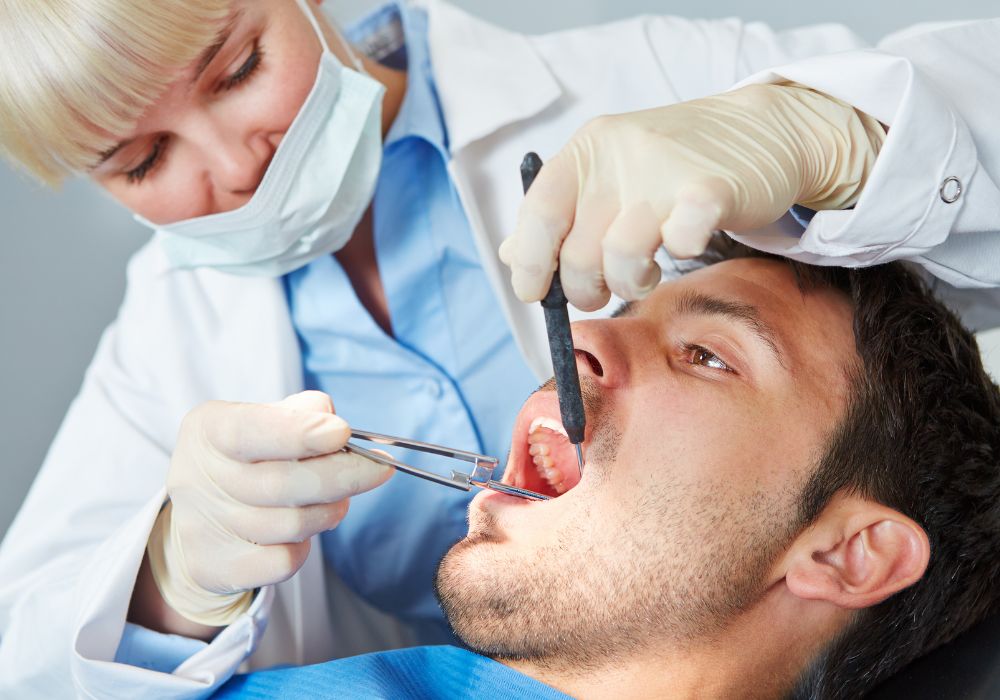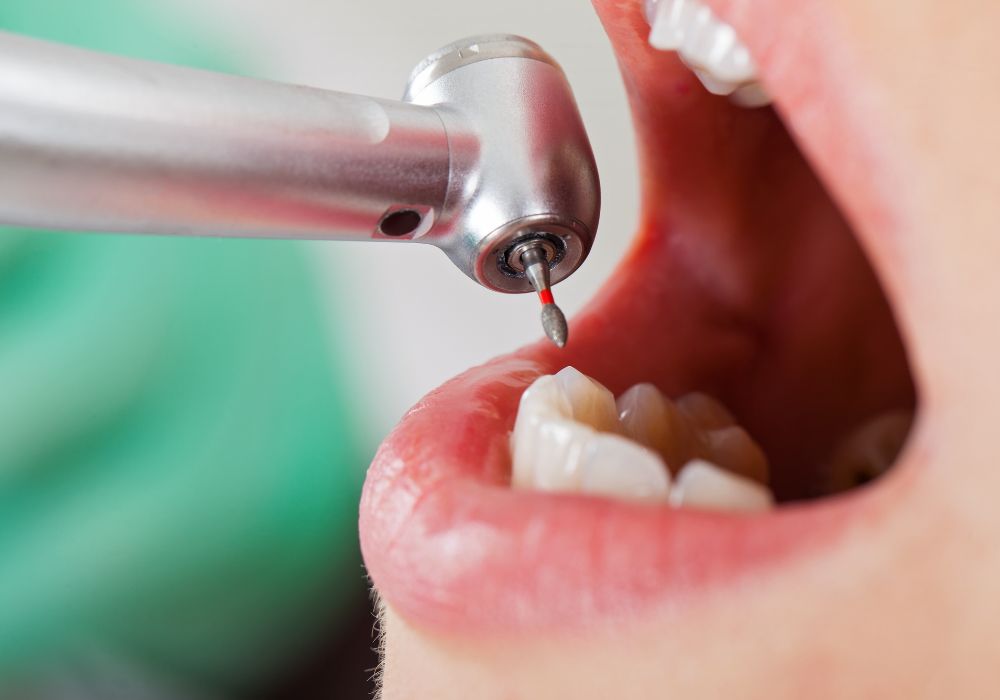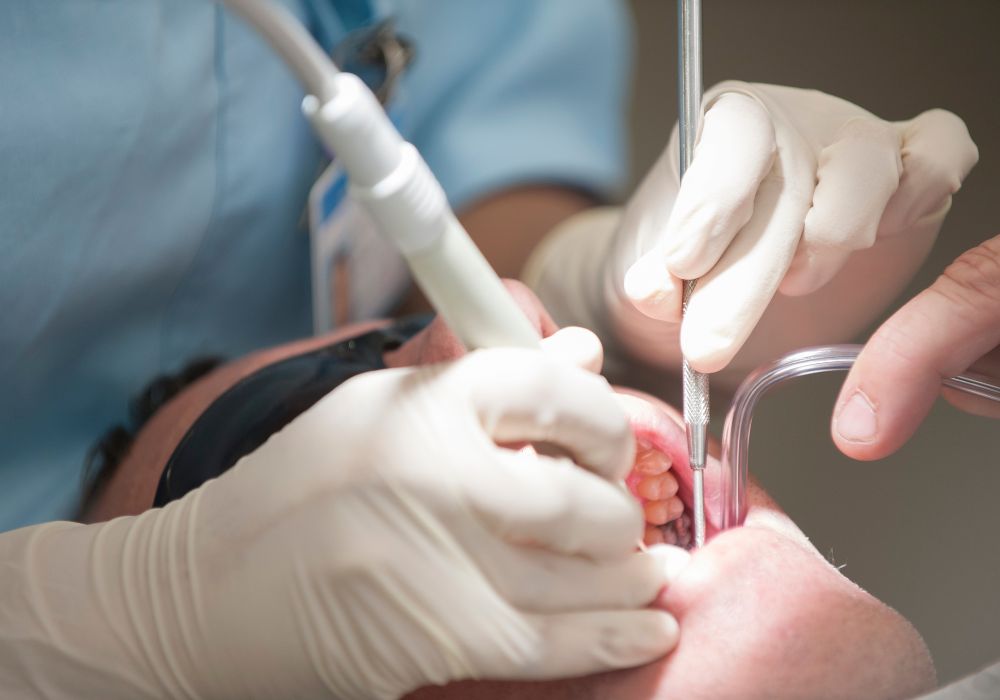Do you have high blood pressure and need dental treatment? Depending on your blood pressure, you may not be able to have some types of oral healthcare and many dentists avoid treating patients with high blood pressure.
In this article, you will find information on what blood pressure is too high for dental treatment. We also cover what is likely to happen if your blood pressure is too high and why knowing your blood pressure is important.
Definition of High Blood Pressure
Normal blood pressure for the average adult is usually near 120/80. If your blood pressure is a little above or below that, there is no cause for concern. You are still within the normal range. However, if your blood pressure readings are consistently much higher, you may have hypertension, more commonly called high blood pressure.
The exact causes of hypertension are not known yet. However, studies have shown that, for example, smoking, lack of physical activity, obesity, age, stress, family history, excessive alcohol consumption, and sleep apnea are all risk factors for high blood pressure.
If high blood pressure is not addressed, usually with blood pressure medication and/or lifestyle changes, it can be dangerous and even fatal. Hypertension makes your heart work harder than it should, possibly leading to hardened arteries or atherosclerosis. It has also been linked to kidney disease, increased risk of stroke, and heart attack.
What Do the Numbers on Blood Pressure Reading Mean?
The upper number of your blood pressure reading refers to systolic blood pressure. Systolic pressure shows the pressure exerted against the artery walls as your heart beats. Diastolic blood pressure is the lower number. Diastolic pressure shows the pressure against the walls when the heart rests between beats.
When is a Blood Pressure Reading Too High for Dental Treatment?
The blood pressure guidelines have changed and the threshold for hypertension is now lower than before. When the blood pressure reading is up to 120/80, you have normal blood pressure. Systolic pressure reading between 120 and 129 is elevated blood pressure and needs more frequent monitoring.
There are two stages of hypertension. At stage one, the readings range from 130/80 to 139/90, and at stage two are readings over 140/90. If a person’s blood pressure is above 180/120, it is known as a hypertension crisis.
Under the new guidelines from the American Dental Association (ADA), your dentist may not be comfortable treating you if your blood pressure is over 130/80. They are certainly likely to postpone treatment if your pressure is over 180/120.
However, each case is unique and there are several factors your dentist will consider when deciding if it is safe to proceed with the treatment. These include how severe the hypertension is and what the dental procedure involves.
Why Knowing Your Blood Pressure Before Dental Treatment is Important

Many people will be surprised to have their blood pressure checked at the dentist. However, in many dental practices, checking the patient’s blood pressure is becoming a routine part of the visit, including regular checkups and cleanings. There are two main reasons why a dentist should check your blood pressure.
High Blood Pressure Can Increase the Risk of Health Problems During Dental Work
For some people, being in the dentist’s chair is a stressful experience and stress can increase our blood pressure significantly. If you already have hypertension issues, the stress you experience during dental procedures could lead to other health problems and even a stroke, heath attack, or kidney failure.
Local Anesthetics Can Increase Blood Pressure
Your dental treatment may require local anesthesia, to keep you comfortable and reduce pain during dental work. Many anesthetic products include epinephrine, which is used to reduce bleeding in the area the dentist is working on and to improve the duration and depth of the anesthesia.
However, to reduce bleeding, epinephrine constricts your blood vessels and this can elevate your blood pressure. If you have high blood pressure, your dentist may need to adjust the dosage of the anesthesia drugs they use to keep you safe during dental work.
How Your Dentist Will Take Your Blood Pressure
When your dentist measures your blood pressure for the first time, they should take a blood pressure reading from both upper arms using a blood pressure cuff. On the following visits, they should then use the upper arm that gave the higher reading.
Your dentist should take two blood pressure readings a few minutes apart. This is because your blood pressure could be temporarily high, for example, if you have been rushing or you feel nervous.
After your visit, they should also give you a written record of your blood pressure reading. You can take this written record to your health care provider who will recheck your blood pressure. If your blood pressure is high, they may prescribe high blood pressure medications for you.
What Happens if Your Blood Pressure is Too High?

When your dental care provider takes your blood pressure and discovers that it is too high to proceed with the treatment, they will postpone the treatment. They will also recommend that you see your primary care physician to get the blood pressure back within the normal range.
Even if you already take hypertension medication prescribed by your physician, your dentist should still take your blood pressure reading before the dental procedure. They should also monitor it during the procedure as well as after it has been completed. Careful monitoring will help avoid problems and keep you safe during your treatment.
Customizing Your Treatment
If there is a possibility that your blood pressure may rise dangerously high during treatment, your dentist can adjust the treatment for you. For example, if you feel anxious about your treatment, your dentist might give you light sedatives.
What if You Are on Blood Pressure Medication?
You should always let your dentist know if you take any medicine for blood pressure. For example, some medications can make you feel faint if you are raised too quickly into a sitting position after lying in the dentist’s chair. When your doctor knows about the medication, they will know to bring you back up to seating slower.
Some drugs for the treatment of high blood pressure can cause side effects such as dry mouth, called xerostomia, or alter your sense of taste, called dysgeusia. Others can lead to oral health issues in patients. If you are taking calcium channel blockers, you may develop gingival hyperplasia, which means your gums are overgrowing.
If your dentist detects this issue caused by your medication, they should give you detailed oral hygiene instructions to address the problem. They will also invite you to dental cleanings more frequently. With some people, especially if not addressed early enough, the gums can become so large that they need surgery.
Hypertension and Oral Health
In addition to blood pressure potentially affecting your dental treatments, there is another link between teeth and hypertension. If your blood pressure reading is regularly above 130/80, you may be told to eat less salt or given a drug to reduce your blood pressure. However, high blood pressure can also be linked to a dental problem.
People who have periodontitis, more commonly known as gum disease, are more likely to have an issue with high blood pressure. This link suggests that taking care of your oral health is as important as your diet and medications in treating high blood pressure.
Why is Knowing Your Blood Pressure Important?

Knowing your blood pressure is not only important when you are about to have dental or other medical treatment but also for your long-term health. Hypertension is often referred to as the silent killer because there are often no symptoms. This means it can go undetected and shorten a person’s lifespan by up to 20 years.
Hypertension tends to be more prevalent in countries where more people eat saltier and fattier diets, have higher alcohol consumption, and exercise less. In the United States, for example, around 80 million people have hypertension. If you monitor your blood pressure and notice abnormalities, contact your primary care provider for a checkup.
Three Types of Hypertension
If you have high blood pressure, it could be one of three varieties. The most common variety is chronic hypertension, which means your blood pressure is higher than average most of the time.
Acute hypertension means you get very high blood pressure but only temporarily. The last variety is called white-coat hypertension. This means that your blood pressure increases when you have to see a doctor, dentist, or another medical professional.
Conclusion
Knowing your blood pressure is important for the prevention of potential medical emergencies during dental treatment. Your dentist may postpone your treatment if your blood pressure is in either hypertension stage. However, each case requires individual evaluation based on several factors.
If your visit to the dentist has led to the detection of high blood pressure, you should contact your physician for further checkups as high blood pressure can increase the risk of stroke and heart disease among other health issues.

